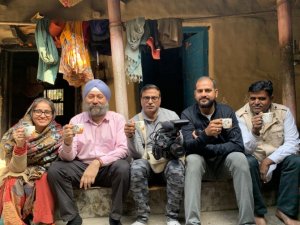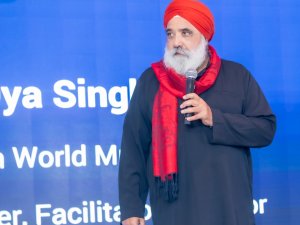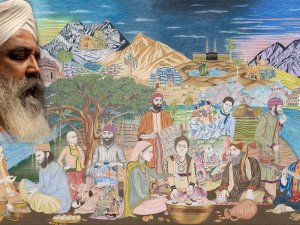Recently a ‘whatsappie’ (one who loves to forward daily sayings or clips on whatsapp), forwarded to me a rather amusing image called ‘Punjabi Naming Theory’.
It has two parts of the most common Sikh names – the first, like ‘Gur’ and the second, like ‘vir’. The list showed that they are interchangeable.
For example, below are two lists. The first list is of ‘first’ syllables of some common Sikh names and they can be put in front of any of the set of syllables in the second list.
Sample of common first syllables of Sikh names:
Har Gur Bal/Bul Jas/Jus Man Nav Sukh Sat Kush/Khush Kul/Kal
Sample of common second syllables:
Preet meet geet Jeet/jit deep dev vir/bir want Inder or Vinder.
You can pick any one of the first syllables and fit them in front of any of the second set and you have a Sikh name.
For example, for the first syllable ‘Har’ in the first list and matching each syllable from the second list, you can have Harpreet, Harmeet, Hargeet, Harjeet, Harpreet, Hardeep, Hardev, Harvir, Harwant, Harinder or Harvinder.
In fact I know a young man, good table player in Sydney who is Harpreet. For the life of me, and creeping old age, I can never remember whether he is Harpreet, Hardeep, Harmeet etc.! And he naturally gets offended when I blurt ‘Har’ loudly and mumble the rest of his name because I cannot remember what the rest of his name is! So, the only way I now remember his name is by remembering him as HP after HP sauce and then follow on with Harpreet. I think he has got used to me calling him just HP now! I also have my own names for a Pp and a Sp. (They know who they are!)
Let us take one more example. For first syllable ‘Kul’ you can have Kulpreet, Kulmeet, Kulgeet, Kuljeet, Kuldeep, Kuldev, Kulvir, Kulwant, Kulvinder or even Kulinder! You can try any of the others for your own amusement. In fact your own name probably falls into this mix and match!!! Jas is a common start syllable. So, Jaspreet, Jasmeet, Jasgeet, Jasjeet, Jasdeep, Jasdev, Jasbir, Jaswant, Jasvinder! And with ‘pal’ at the tail – Jaspal.
By the way, most of this article is tongue-in-cheek and for fun. It is not meant to hurt. I do hope that I do not offend anyone who has or has named a Sikh child with a good Sikh name. The ones, supposedly 'Sikhs' who have given their kids silly, without meaning, or just non-Sikh names are justified in getting offended.
These are merely observations and perhaps some insight if you are involved in naming a Sikh child in the future - food for thought. All these names mentioned above are good solid traditional Sikh names. But perhaps we need to become more imaginative, creative and perhaps responsible if choosing a name for a kid.
The list is not exhaustible. You can have even a very nice two syllabled name like Karam become Karampreet, Karamgeet, Karamjeet, Karamdeep, Karamvir, Karamvinder or even Karaminder.
Then, there are those who feel that the name is not long enough. Then, just add on a second syllable from the second list, like Balvinderjit, or add two on two in some cases and one can have Gurbalvinderjit, Harbalvinderpal, etc. Some folks just love triple-barrel names with ever confusing meanings. It is as if they are compensating for some deficiency by having as long a name as possible!
Meanings? Some of you ask! Yes, Sikh names and even names in a great many other religions and cultures have meanings. The aura of the meaning of a name can have a profound effect on the personality of the person so named. I have personally witnessed this. I shall explain as we go on.
Names used to be simple and short. Panj Pyare – Daya, Dharam, Sahib, Mohkam and Himmat. I even shortened mine further to Dya. (Incidentally I am often asked why my name is Dya when the normal English spelling is Daya. Well Daya is a male-midwife (dayi/daya). Dya is compassion. I prefer to be compassion!!!)
Very few Dharams now. Now, you have Dharamvir, Dharamjeet, Dharampal etc. Even Sahib now becomes Sahibjeet or Sahibvir.
I have friends who will add ‘jeet’ or ‘win’ or ‘pal’ or ‘want’ after the names of all their children because their own names ended with that syllable. A friend has his name ending in ‘jeet’. He has named all his offsprings with ‘jeet’ at the end. Now he even has his grandchildren all ending in ‘jeet’ as well!
One couple has all their offsprings start with the syllable ‘Har’ because both their first syllables are also ‘Har’. One dear friend, bless him, has even used his first name Partap as surname for his children. He wants his own first name to live on as a surname. So, his offsprings are Delvinder Partap, Kashminder Partap, Gavinder Partap and Sheila Partap. He has done away with Singh or Kaur altogether. And, of course future generations will have the surname Partap.
We sometimes seem to lack a certain degree of originality and perhaps basic understanding of how to name our Sikh kids and what profound impact it can have on the child.
There are those who prefer camouflaged Christian names like Sharan (Sharon), Harman (Herman), Pal (Paul). Or names with a view of having a Christian nickname – Rickywant for Ricky; Shirleypreet for Shirley; Vickydeep for … you guessed it – Vicky. Perhaps, it is some sort of inferiority complex for anything ‘Sikh’? And the names are without any kind of meaning.
I can understand Sikh parents in western countries wanting to ensure that their offsprings’ names are not open to ridicule from non-Sikhs, like Faqir, Arsdeep, Sukdeep, Ramandeep, Fagun etc.
My grandson, born and bred in Australia, had a calling card handed to him by a Sikh restauratier nicknamed Paddy. When he looked at the name later he could not stop laughing. The name was Pardaman, a good solid Sikh name no doubt. Even though he only knows very basic Punjabi, he does know that the first part of the name means flatulence – ‘the flatulence man!
A friend not fully conversant with naming, took my advice and came to me for the ‘Naamkaran’ ceremony. The letter which came up from the Guru Granth Sahib Hukmnama was ‘a’ (airda). We discussed a few names and luckily he rang me just before registering the kids name. He said, his wife who was from India insisted on Asman (sky). I stopped him immediately. I asked him whether he had considered the English pronunciation and inevitable derivation – Assman or Arseman! No, he had not considered that of course. You can imagine the ridicule and bullying that kid would have faced just because of his name! I suggested Akash and thankfully he accepted that.
Let us look at the protocol or Sikh rite for naming. It is called ‘Naamkaran’. We name our children after asking for Guru Ji to shower His blessings on the newborn. In the Ardaas for the newborn we normally ask for lemi umar (long life), chardhi kala (ever optimistic temperament), Sikhi jeevan (life in Sikhism), tandrosti (good health), etc, and most importantly – gift of naam. And, also, we request direction and His Blessings in what name the child should have. We carry out all that we do, every function, with His Blessings and by His direction. It is no different for naming the newborn. (Keeta lodiyay kam so Har pai aakhiyai.)
Then we take a Hukmnama or Vaq (reading of a short stanza from Sri Guru Granth Sahib Ji at random). The name should start with the first letter of the first word of the Hukmnama. (With my name my venerable father had no problem because the first word itself was ‘Dya’!) Some say that if you cannot find a suitable name from the first letter then you can also do so from the first letter of the second word.
I have a saintly friend who names a child if asked, after reading the HukmNama, reflecting on it and bearing in mind the ‘rehni-behni’ (life-style or spiritual bent) of the parents then naming the child to best suit them and the child, within Sikhi or towards Sikhi. The HukmNama then becomes the primordial sikheya for the child and the family. He normally insists that the HukmNama is printed and kept for posterity, preferably framed and put on a wall. It is like a life ‘Mission Statement’ for the child.
But then, one couple recently, very reverently asked for such a naming ceremony, went through the process and then named their child Jaydn, after the son of the actor Will Smith. “O Will Smith’s son is sooo cute”! I was flabbegasted.
A great many just do not even know that there is such a protocol and blessings from Guru Ji. Secondly, from advice from wise elders, I have gathered that a name must be meaningful because the meaning can influence the character of the child.
My oldest daughter is named Jamel Kaur. (Yes, ‘J’ was the first letter of the first word of her HukmNama and I researched her name after finding it in an Urdu dictionary.) Jamel is an adjective which means pleasant, kindly, well-meaning in Pharsi/Urdu/Punjabi. It normally applies to thoughts, feelings. One with kindly thoughts for others. And she has turned out to be that kind of a person. She might have been hurt, and has been numerous times by others, but she never does anything to harm someone else. Infact she goes out of her way to help others – even go to the aid of those who have hurt her previously.
I am yet to come across a Sher Singh who looks, acts or behaves like a goat! (Sher means tiger.) I have a nephew Nehal Singh. He is a staunch level-headed amritdhari Sikh, born and bred in Australia. He is studying law. Humble, yet he lights up a room with his presence!
I came across a young lady in a Sikh youth camp in USA who was called Pinkypreet. She was shy and with little self-esteem. On asking her how she had come to have received such a name, she told me that when she was born, she was apparently pink and very pretty that her father just had to name her Pinkypreet. I was dumbfounded! She is not pink any more! Of course her nickname is Pinky! There is a Loveleen Kaur – Lovely for short. Bubblejeet – Bubbly for short.
A friend in UK named his daughter Trishul. He had seen and liked a Hindi movie with that name and that was it. I asked him if he knew what trishul meant? No, he did not. Within one year the family fell apart. The couple broke up and Trishul is an angry, fiery kid with a split personality who is into drugs - always getting into trouble. Trishul is a three-pronged spear – a Hindu weapon of offence.
I know a couple of Sewa Singhs who, naturally enough, are great Guru-kay-Sewadar.
Some folks look down upon ‘old-fashioned’ or Guru Granth Sahib driven names and in their efforts to find new names come up with sometimes hilarious answers like Dimple, Kaseyjeet, Kelvinder and so on. Names with nothing to do with Sikhi. Others resort to names of famous actors or just popular Hindu names. We have Shatrugan, Akshay, Aruna, Sadhana, Amitabh and also his son Abhishek, Abhinash … you catch my drift.
There are strong traditionalists who insist only on old traditional names. I am a little less traditional but I still urge some thought and understanding and just not modernity or trends.
I believe that as Sikhs we are responsible for serious thought when coming to name a child. Think of the child’s future. What are your own aspirations for your kid for the future? Think meaning. Think lofty ideals. Think Sikhi. Think nearness to Guru Ji and Waheguru. You do want Guru Ji’s Blessings and His ‘neder’. Don’t you? Go beyond your own selfish reasoning. Think outside all that. Think global. Think global Sikhi. Think of the path of enlightenment of your child, besides its good health, not to be bullied, being able to study well, earn a good living and so on.
For originality of fresh ‘Sikh’ names, I have always admired Yogi Harbhajan Singh Ji. He gave those who became Sikhs through him some memorable names. Who can go past Gurumustuk Singh, Guruka Singh, Gurushabad Singh, Satkartar Kaur, Har-rai Singh, Hargobindhari Singh, Harimanderjot Singh, Jodha Singh, Jivanjyoti Kaur, and the list goes on.
In days gone by, it was usual for the Granthi Sahib or some venerable sangat member to name a child. These days, especially with western influences, parents feel the right to name their child. Even within the royal family in UK, Prince Harry’s American wife has decided to break with centuries old British protocol by naming her newborn Archie! So I guess why should Sikh parents be different.
All I suggest is that - look for advice from older Sikhs, especially the Sikhi learned older folks before naming your child. Also do some research of your own. Remember, most importantly, that a name should have a meaning and will have a bearing on the moulding of the character of the newborn.
I had the honour of meeting Sikh childrens book writer, poet and active member of SikhRi, Inni Kaur and I asked her why such an unusual name? Inni is a small fragrant flower surviving in the desert of Iran and her father bestowed her with that name. What a wonderful name! Universal, yet Sikh and very significant. Inni is a resilient and service-orientated lady. She certainly is strong, determined and leaving her mark on the Sikh world!
Happy Sikhi Naming.





